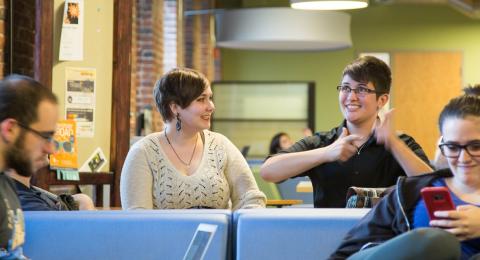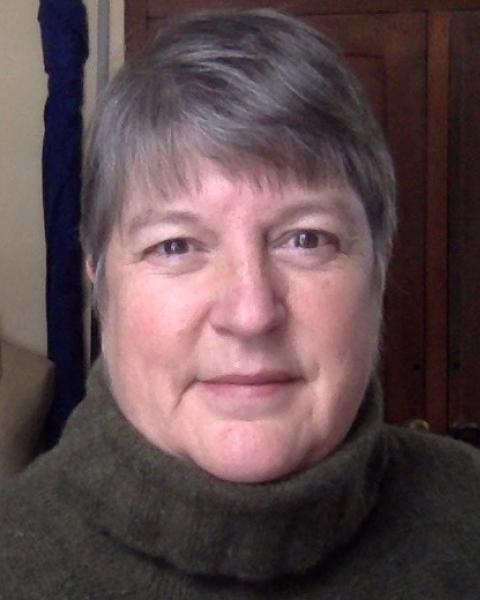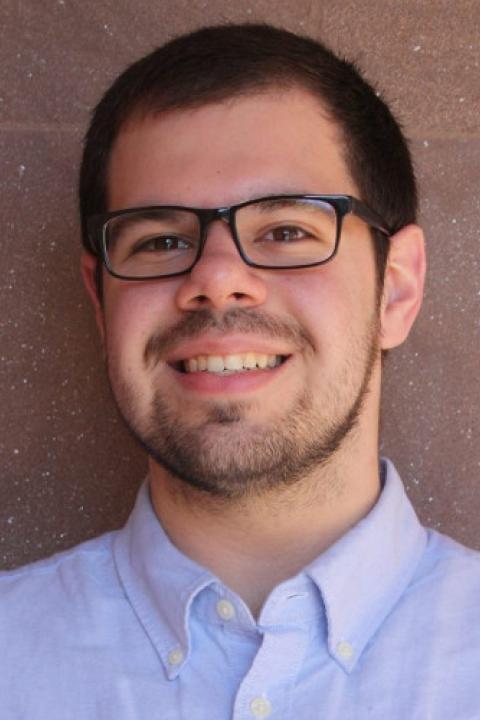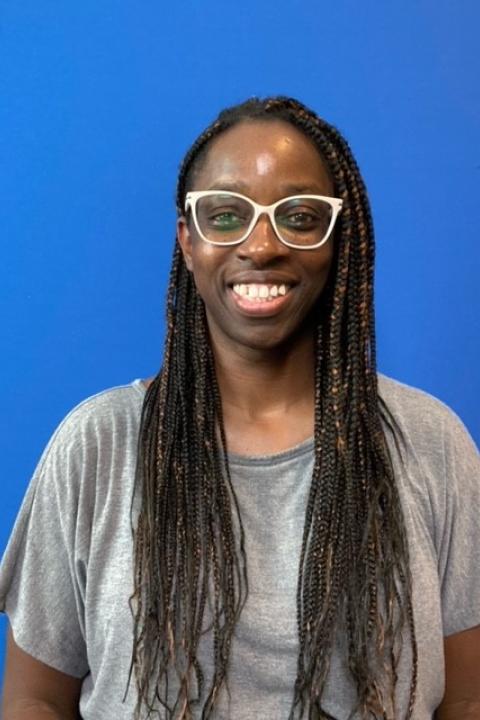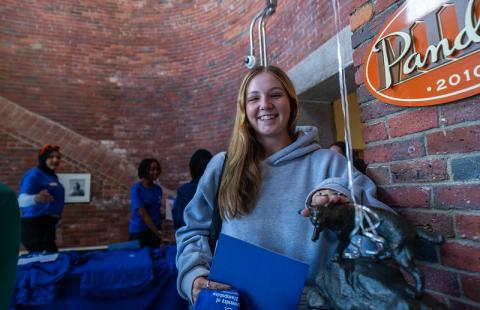Preparing skillful interpreters through interaction and immersion
The ASL/English interpreting program at UNH Manchester was the nation’s first program to be accredited by the Commission on Collegiate Interpreter Education and is one of only 15 accredited programs in the country. You’ll learn American Sign Language and the foundation of ASL/English interpreting from distinguished faculty, all of whom are native ASL signers and/or certified interpreters.
What is ASL/English interpreting?
American Sign Language/English interpreting prepares students to work with the Deaf community through learning the intricacies of American Sign Language and Deaf culture, as well as the skills to pursue a career as an ASL/English interpreter. Interpreters use ASL and spoken English to allow people without a language in common to interact. The profession requires strong ASL and English skills, attention, critical thinking and memory.
Why study ASL/English interpreting at UNH Manchester?
The ASL/English interpreting program at UNH Manchester was the nation’s first accredited interpreting program and is one of only 14 accredited programs in the country. Our program has developed a national reputation for quality, integrating students with the Deaf community inside and outside the classroom. During senior year, students are paired with a nationally certified mentor and have the opportunity to apply their interpreting skills in a variety of settings throughout New Hampshire. Our graduates have pursued careers in ASL/English interpreting, deaf education, rehabilitation, healthcare, audiology, social work, counseling and the media.
Potential career areas
- Education
- Government
- Law
- Linguistics
- Media
- Medicine
- Performing arts
- Psychology
- Social services
New England Residents
Connecticut, Maine, Massachusetts, Rhode Island and Vermont do not offer a bachelor's-level ASL/English interpreting program in their public universities, so students from these states can enroll at a reduced tuition rate.
Curriculum & Requirements
The American Sign Language (ASL)/English Interpreting program at UNH Manchester is a specialized, in-depth program with a national reputation for quality. In 1999, the program became the first interpreting program in the country to be found in compliance with the National Interpreter Education Standards of the Conference of Interpreter Trainers (CIT). In 2007, the program became the first interpreting program in the nation to be accredited by the Commission on Collegiate Interpreter Education (CCIE), and, in 2017, the program became the first program to be re-accredited by CCIE. UNH Manchester also houses one of northern New England's most comprehensive collections of books and media materials on ASL/English Interpreting.
The program is guided by the premise that deaf people, as a linguistic minority, possess their own cultural values, literature, history, traditions, and social conventions. Interpretation requires bilingual and bicultural competence in spoken English and American Sign Language. The ASL/English Interpreting program at UNH Manchester provides students with a strong theoretical foundation as generalists in ASL/English Interpreting and helps prepare students for either state-level interpreter screening or national Registry of Interpreters for the Deaf (RID) interpreter certification, depending on students' skill level and experience.
Graduates may go on to pursue specialty areas in interpretation or related fields of study.
Students who complete the bachelor of science degree in ASL/English Interpreting graduate with a varied and flexible academic base. Interpreting requires skills such as sustained powers of concentration, versatility in dealing with a variety of people and content areas, fast-thinking and excellent communication skills in the respective languages. Students seeking to become interpreters receive a foundation in American Sign Language, Deaf culture, and the interpreting process, and their programs of study often include elective courses examining specific specialized settings such as Healthcare or on special topics such as theater and translation. Students also gain a thorough grounding in the liberal arts through the University's Discovery program.
Graduates of the ASL/English Interpreting program may pursue careers in ASL/English interpreting, deaf education, rehabilitation, health care, audiology, social work, counseling, and the media. The program provides students with a varied and flexible academic base. Graduates are prepared for further study in such fields as psychology, communication, linguistics, sociology, and anthropology.
For more information, the UNH Manchester Office of Admissions at (603) 641-4150.
Sample Course Sequence
| First Year | ||
|---|---|---|
| Fall | Credits | |
| ASL 435 | American Sign Language I | 4 |
| ENGL 401 | First-Year Writing | 4 |
| INTR 438 | A Socio-cultural Perspective on the Deaf Community | 4 |
| UMST 401 | First Year Seminar | 2 |
| Discovery Course | 4 | |
| Credits | 18 | |
| Spring | ||
| ASL 436 | American Sign Language II | 4 |
| INTR 430 | Introduction to Interpretation | 4 |
| Discovery Course | 4 | |
| Quantitative Reasoning Course | 4 | |
| Credits | 16 | |
| Second Year | ||
| Fall | ||
| ASL 531 | American Sign Language III | 4 |
| INTR 439 | Ethics and Professional Standards for Interpreters | 4 |
| Discovery Course | 4 | |
| Discovery Course | 4 | |
| Credits | 16 | |
| Spring | ||
| ASL 532 | American Sign Language IV | 4 |
| INTR 540 | Translation | 4 |
| INTR 539 | Comparative Linguistic Analysis for Interpreters | 4 |
| Discovery Course | 4 | |
| Credits | 16 | |
| Third Year | ||
| Fall | ||
| ASL 621 | Advanced American Sign Language Discourse I | 4 |
| INTR 630 | Consecutive Interpretation I | 4 |
| Discovery Course | 4 | |
| Elective Course | 4 | |
| Credits | 16 | |
| Spring | ||
| ASL 622 | Advanced American Sign Language Discourse II | 4 |
| INTR 636 | Consecutive Interpretation II | 4 |
| Discovery Course | 4 | |
| Elective Course | 4 | |
| Credits | 16 | |
| Fourth Year | ||
| Fall | ||
| INTR 732 | Simultaneous Interpretation | 4 |
| INTR 734 | Field Experience and Seminar I | 4 |
| Elective Course | 4 | |
| Elective Course | 4 | |
| Credits | 16 | |
| Spring | ||
| INTR 735 | Field Experience and Seminar II | 4 |
| Elective Course | 4 | |
| Elective Course | 4 | |
| Elective Course | 4 | |
| Credits | 16 | |
| Total Credits | 130 | |
Degree Requirements
All Major, Option and Elective Requirements as indicated.
*Major GPA requirements as indicated.
Major Requirements
- Students must complete 64 credits in the major, 40 credits in the University's Discovery program, and 24 credits in elective courses.
- Students must complete 64 credits in the major with a grade of C or better. Students who earn less than a C on a particular course may repeat that course only once.
- Students must achieve a GPA of 2.5 or better in major courses and must pass both ASL 532 and INTR 630 with at least a B- (or successfully demonstrate competence in American Sign Language and consecutive interpretation, respectively).
- Transfer students must complete a minimum of eight ASL/English Interpreting courses at UNH Manchester.
| Code | Title | Credits |
|---|---|---|
| Language Courses | ||
| ASL 435 | American Sign Language I | 4 |
| ASL 436 | American Sign Language II | 4 |
| ASL 531 | American Sign Language III | 4 |
| ASL 532 | American Sign Language IV | 4 |
| ASL 621 | Advanced American Sign Language Discourse I | 4 |
| ASL 622 | Advanced American Sign Language Discourse II | 4 |
| Culture and Linguistics Courses | ||
| INTR 438 | A Socio-cultural Perspective on the Deaf Community 1 | 4 |
| INTR 539 | Comparative Linguistic Analysis for Interpreters | 4 |
| Interpreting Courses | ||
| INTR 430 | Introduction to Interpretation | 4 |
| INTR 439 | Ethics and Professional Standards for Interpreters | 4 |
| INTR 540 | Translation | 4 |
| INTR 630 | Consecutive Interpretation I | 4 |
| INTR 636 | Consecutive Interpretation II | 4 |
| INTR 732 | Simultaneous Interpretation | 4 |
| INTR 734 | Field Experience and Seminar I | 4 |
| INTR 735 | Field Experience and Seminar II | 4 |
| Total Credits | 64 | |
- 1
ASL/English Interpreting majors cannot use this course to fulfill the SS Discovery Program requirement.
Capstone Experience
The capstone experience in the bachelor of science degree program in ASL/English Interpreting is met by INTR 735 Field Experience and Seminar II, which is a senior-level course and the last in the sequence of courses required for the major. In addition, students participate in a research experience. Starting in INTR 636 Consecutive Interpretation II and continuing in INTR 732 Simultaneous Interpretation, students identify an area of interest, conduct a literature review, and design and complete a research project. At the end of INTR 732, students submit a completed paper and present on their findings. These courses meet the following two criteria of the capstone experience for this major:
- the capstone synthesizes and applies disciplinary knowledge and skills
- the capstone demonstrates emerging professional competencies.
Program Learning Outcomes
- Development of language competency in both American Sign Language and English to foster entry into the field of interpreting.
- Development of competencies needed for meaning transfer.
- Development of skills for self-assessment for process and product of interpreting.
- Development of decision-making skills and critical thinking to assess an interpreted situation and the source language, target language, setting and participants.
Explore Program Details
-
Assistant ProfessorDirector of ASL/English Interpreting programEmail: Laurie.Shaffer@unh.eduPhone: (603) 641-4134
An important part of learning any language and learning the interpreting process is moving beyond the classroom lessons to become more comfortable in real-life situations. The ASL labs help advance your skills by giving you valuable practice in grammar and vocabulary through communication exercises with Deaf lab facilitators and members of the Deaf community. Interpreting labs provide live opportunities to work with certified interpreters and members of the Deaf community to enhance your interpreting skills. The program offers a video lab in which you can record your progress, allowing you to receive valuable feedback from your professors and peers.
We have recently added ASL labs to all six ASL courses that are required for the major. All of the ASL lab facilitators are Deaf, native ASL signers. In the first two ASL labs, students engage in communication-related activities that reinforce their learning in the ASL courses (by communicating with a Deaf, ASL signer, etc.). In the next two ASL labs, students invite members of the Deaf community into class via videophone and interview them, as well as discuss various topics in the lab. In the last two ASL labs, students are placed in the community with various Deaf people and meet every three weeks for the seminar portion of the lab. The interpreting labs are all taught by nationally-certified interpreters. Students practice interpreting, learn about communicating with DeafBlind people, working within an interpreting team (i.e., interpreters often work in pairs for lengthy or highly-demanding assignments), etc. Deaf and DeafBlind people, as well as other nationally-certified interpreters, are invited to participate in these activities, as appropriate. In the upper level Interpreting classes, Deaf people come in to class several times throughout the semester to participate in mock interpreting scenarios for student practice.
Through hands-on learning in the classroom and in the field, you’ll develop the skills you need for an impactful career in the Deaf community. The Bureau of Labor Statistics projects 29 percent growth in the interpreting field between 2014 and 2024, translating to vast possibilities for your future.
Broaden your understanding of Deaf culture and your ability to interact with the Deaf community through our American Sign Language and Deaf Studies minor. You’ll acquire basic ASL fluency while adding a breadth of sociocultural perspective to your degree.
- H. Dee Clanton, State Coordinator, Program for the Deaf and Hard of Hearing /Dept. of Ed. (DOE)
- Michelle McConaghy, Executive Director, Northeast Deaf and Hard of Hearing Services (NDHHS)
- Susan Wolf-Downes, New Hampshire Association of the Deaf representative
- DT Bruno, Greater Nashua Mental Health Deaf Services representative
- Jola Leary, New Hampshire Registry of Interpreters for the Deaf
- Jotham Otterson - Director of American Sign Language, Pinkerton Academy
- Student representative
- Alumni representative
We've partnered with Northern Essex Community College to develop a pathway that shows you how your community college courses will transfer into UNH Manchester's ASL/English Interpreting program.
